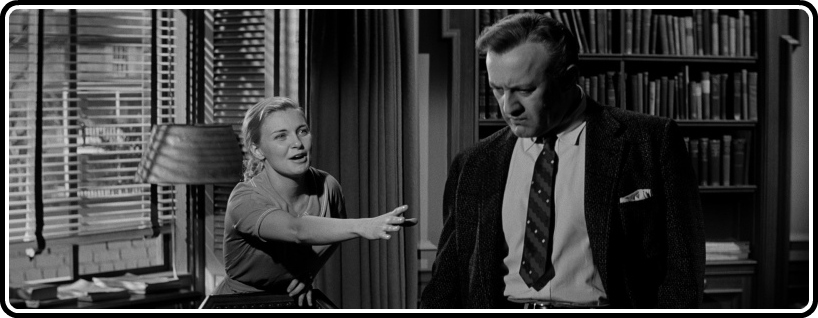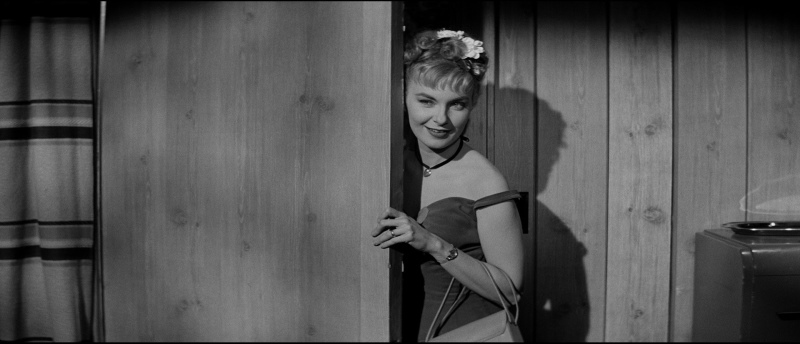
In the midst of the most fruitful, artistically-driven decade in its history, Hollywood also had a particular obsession with psychiatry, especially extremely clinical, unchallenging, and extremely trite uses of it. It all kind of came to a head with Psycho in 1960, in which a psychiatrist suddenly comes onscreen and gives us a five-minute lecture on just what was wrong with poor Norman Bates, but you can go back to the very beginning of 1950, with Harvey, to see just how interested Hollywood was in presenting the study of the mind in the least interesting ways possible (see also: The Caine Mutiny, Rebel Without a Cause; Hitchcock’s Spellbound is a good antecedent, a film that puts out a lot of surreal imagery only to ensure every element is a one-to-one correlation with some repressed element of the subject’s subconscious).
The Three Faces of Eve may be the worst offender, and, sadly, the best example. The film was nominated for only a single Academy Award – Best Actress for Joanne Woodward, which she won. She won the same award at the Golden Globes, and was nominated for a BAFTA. Neither organization nominated the film for anything else. This is an example of how, sometimes, awards organizations can get things example right. Woodward plays Eve White, an ordinary housewife who, after a series of strange behaviors, is diagnosed with multiple personality disorder. Needless to say, that gives Woodward quite a lot to work with, but moreover, she finds the connective tissue between these various people in a way that seems as though they could all actually come from the same psyche.

Unfortunately, the rest of the film is so thuddingly dull, skipping over any potentially scandalous material (that Eve’s most prominent “other” personality is sexually promiscuous is both cause for exploitation and bashfulness, neither terribly intriguing) in an effort to hit a series of story beats, highlight a domestic conflict that ends up pretty much exiting the picture halfway through with few tears shed, and a whole lot of explanation of just what multiple personality disorder is. The most aggressive angle comes courtesy of a narration track by journalist and TV personality Alistair Cooke, included in an effort to lend grave seriousness to the proceedings. It’s all a little strained.
Shot in CinemaScope, a requirement for most Fox productions at the time, and by Stanley Cortez no less (only two years removed from blowing all our minds for all eternity with The Night of the Hunter), The Three Faces of Eve still struggles to find an effective aesthetic foothold. Johnson, who was a journalist, screenwriter, and producer (in that chronological order) for more than three decades before he ever stepped into the role of director, and his shooting style has a certain reserved professionalism about it, looking to get the most out of every shot, though without the positive implications that may carry. His philosophy seems more geared in a “how much of this page can we cover with a single shot,” resulting in a film that feels very static, and actors often left without a lot to do.
Fox’s new Blu-ray presents the film accordingly – handsome, clean, crisp, but far from exceptional and certainly not revelatory. It’s a step up from what you’d see broadcasted on an HD movie channel, but certainly not up to the possibilities of the format. The commentary track, by film historian Aubrey Solomon, is a solid enough track, though he often falls silent for long periods of time, only to pick up right where he left off (or, weirder, divert to another topic, then return to previous one, with no onscreen action motivating either), resulting in the sense that he only prepared about forty-five or fifty minutes of material that wasn’t very scene-specific. Still, there’s a ton of behind-the-scenes information in there, along with some light analysis, that makes it well worth sticking through. The only other special features are a short clip of Woodward accepting her Oscar and the film’s original trailer, so that commentary is where you’ll want to hang your hat, if only a hat could be hung on special features.


